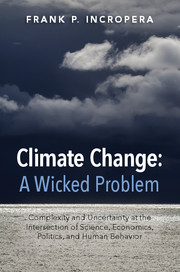 Climate Change: A Wicked Problem
Climate Change: A Wicked Problem Published online by Cambridge University Press: 05 October 2015
Consider the atmosphere from any point on the Earth's surface. Move east, west, north, or south; the atmosphere has no boundaries. If a CO2 molecule is discharged from a point source in the United States, it can move in any direction, and one year hence it could be over India, Brazil, or anywhere else in the world. Likewise, GHG emissions in India and other nations make their way to the United States and to every other nation. All nations contribute to GHG emissions, some more than others, and all nations are recipients of the emissions. Geographically, the atmosphere is nondiscriminatory.
To the extent that GHG emissions contribute to global warming and, in turn, warming contributes to climate change, inherent problems are not local, regional, or national. They are transnational. The problems cannot be solved by any one nation – although some can contribute more than others – but must be addressed by collaboration among all nations. Even the smallest of nations that contribute little to GHG emissions must be involved, for they may well be among those most adversely impacted by climate change and least able to adapt.
Whether the problem is perceived as potential or omnipresent, the fact that it is international is indisputable. And the international community has been paying attention. In this chapter, we will examine efforts to address the problem and the mine fields that have impeded substantive progress. As applied to climate change, the chapter is a history lesson in geopolitics, highlighting how difficult it is to achieve consensus among nations of widely disparate cultures and economic conditions.
The Intergovernmental Panel on Climate Change
International agreements have long been used to address environmental issues for segments of the planet as diverse as the atmosphere, the open seas, and Antarctica. A relatively recent agreement is the Montreal Protocol of 1987, which calls for protection of the stratosphere's ozone layer through elimination of industrial chemicals termed chlorofluorocarbons (CFCs) and hydrochlorofluorocarbons (HCFCs).
Although interest in global warming can be traced to the late nineteenth century (Weart, 2003), it was not until 1988 that the issue began to receive serious attention.
To save this book to your Kindle, first ensure no-reply@cambridge.org is added to your Approved Personal Document E-mail List under your Personal Document Settings on the Manage Your Content and Devices page of your Amazon account. Then enter the ‘name’ part of your Kindle email address below. Find out more about saving to your Kindle.
Note you can select to save to either the @free.kindle.com or @kindle.com variations. ‘@free.kindle.com’ emails are free but can only be saved to your device when it is connected to wi-fi. ‘@kindle.com’ emails can be delivered even when you are not connected to wi-fi, but note that service fees apply.
Find out more about the Kindle Personal Document Service.
To save content items to your account, please confirm that you agree to abide by our usage policies. If this is the first time you use this feature, you will be asked to authorise Cambridge Core to connect with your account. Find out more about saving content to Dropbox.
To save content items to your account, please confirm that you agree to abide by our usage policies. If this is the first time you use this feature, you will be asked to authorise Cambridge Core to connect with your account. Find out more about saving content to Google Drive.